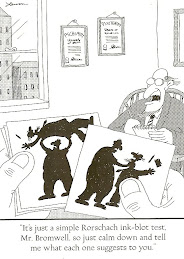Insomnia is a common complaint in any doctor's office and by far one of the most common complaints in psychiatry. While there are various medical conditions to be ruled out (such as obstructive sleep apnea), the vast majority of cases are either mood- or stress-related, or else have no obvious cause. Many cases are chronic. Likewise, while there are many medications available to treat this condition, medications are not without their side effects and, for chronic sufferers, even the most effective sleeping pills lose their efficacy over time.
Regardless of whether or not you choose to submit to pharmacological or other medical treatments for insomnia, a good starting point is what health care providers call good "sleep hygiene." These are important tips that should be followed by everyone, whether you suffer from clinical insomnia or just the occasional fitful night of sleep (or the lack thereof). Sleep hygiene refers to one's habits concerning sleep.
Avoid caffeine and other stimulating substances before bedtime. Not only will caffeine keep you alert, but it is a diuretic. Diuretics promote the excretion of water by the kidneys, making middle-of-the-night trips to the bathroom more necessary. This is already a problem for many older adults.
Avoid excessive use of alcohol. Alcohol of course is itself sedating (it's one of the principal ingredients in NyQuil), but taken during the day or early evening, alcohol can actually lead to a rebound state of wakefulness at bedtime or in the middle of the night, greatly exacerbating insomnia. It's also a potent diuretic.
Avoid going to bed on a full stomach immediately after eating a heavy meal. If you suffer from acid indigestion, remember that lying down tends to aggravate reflux; bedtime is one of the best times to take an antacid.
Avoid a heavy workout before bed. Adrenaline and other stress hormones that are released during vigorous exercise will keep you wide awake. Schedule your workouts for the early afternoon, or better yet, start your day off right and exercise first thing in the morning; it will set a great mood and energy level for the whole day!
Ensure the right sleeping environment: for most people, a dark, quiet, cool room. If you sleep better with a little "white noise," try an oscillating fan (which works nicely to keep you cool as well), or invest in a sound machine. The TV's sleep function works as well, but turn the volume down low and pick something you have no interest in. For children, a night light can make all the difference (for some adults, too!). An aquarium provides a little light and a nice, soothing water effect as well. If you work the night shift and sleep during the day, draw the blinds or consider a night mask.
Adjust the temperature of the room to your comfort; most people have trouble sleeping when it's too warm. On the other end of the spectrum, body temperature drops when you sleep, so light sheets are always a good idea and sometimes a blanket. In the winter, sleeping by a fire can be wonderfully cozy (but please, attend to fire safety measures, always!).
A soft but firm mattress and a comfortable pillow or two go without saying. (I sleep with two pillows, one of which is a long body pillow with which I travel whenever I can.)
Many people report that having an orgasm leads the body quickly into sleep, other physical parameters permitting.
A lot of people also recommend reserving the bedroom for sleep (and sex), so that the bedroom environment becomes associated with sleep in the mind. I'm not sure this behavioral principle (conditioning) is as relevant as it's cracked up to be. Watching a little television or reading in bed is okay for most people and can even be part of the process of winding down from the day.
Conversely (as far as operant conditioning is concerned), I do think it's useful to develop a little ritual before bed each night. Make it your own: wash your face, brush your teeth, pet your cat…whatever suits you. This starts the winding down process and begins to alert and mind and body that sleepytime is approaching. One of the most impossible things to do is to come directly home from work or some other stressful situation with the weight of the day's worries still on your mind and thoughts about everything you still have to do tomorrow and jump in bed and close your eyes and try to immediately fall asleep with no in-between downtime. It's not practical and it's not healthy.
Another behavioral/environmental principle suggests that if you don't fall asleep within the first half hour or so, don't lie in bed fretting and watching the clock. Instead--if it's practical--get up for a little while, maybe have that proverbial glass of warm milk* or fix a light snack, perhaps do a little tidying up or a quick chore you had left undone before going to bed, or read a little or watch a little television until you begin to feel like you can try again.
Again, this "if you can't beat 'em, join 'em" approach is not always practical; you may live with someone who is sleeping just fine whom you don't want to wake, or it may be very late at night and you have to be up early the next morning, but one of the worst things you can do is toss and turn. It ratchets up your stress level and decreases the likelihood that you will get any rest. And if you have to get up early anyway, sometimes it's simply best, if there's only an hour or two to go, to just go ahead and get up for the day. It avoids wallowing in misery until the bitter end when the alarm goes off and you haven't slept a wink anyway and hopefully you will be that much more prepared for sleep the following night.
This is not about giving up; it's about finding some peace of mind through acceptance.
This is another way of saying: DON'T WATCH THE CLOCK. If it's the middle of the night and getting out of bed is not a reasonable option, it's better to lie there quietly with your eyes closed and your mind relaxed than it is to fight being awake. You won't sleep if you are fighting anything anyway, and so acceptance of not being asleep will at least make it less arduous. This technique of being okay with being awake removes at least one barrier to deeper relaxation: frustration and anxiety. Oftentimes boredom will set in, and if you can avoid becoming irritated by THAT, and remain still and quiet, the body's natural response will actually be…to slip into a light sleep! So don't fret, and just be awake if that's what you have to be, but don't be surprised if letting go doesn't just give you what you've been struggling to achieve all along.
This actually works. It depends on stopping yourself from thinking, "I'm still awake…When am I going to fall asleep?...What time is it?...I have to work in the morning…I'm still awake…What time is it now?" At first you may have to remind yourself to stop reminding yourself that you're not asleep yet, which is obviously a bit counterproductive in itself, but eventually you'll get the hang of it.
Counting sheep (metaphorically speaking, of course). This is a bad idea. By this I mean thinking about anything, no matter how mundane. Reviewing the day and planning for tomorrow should be part of the winding down process, not part of the falling into sleep process. It's just another form of watching the clock, really.
The brain goes to sleep when it has nothing better to do. In other words, the mind can only fall asleep when it goes blank; so long as you are thinking about something--anything--you won't fall asleep, you'll go on thinking. Concentrating on anything (sheep included) is counterproductive.
You might think that you fell asleep last night thinking about this or that, but in actuality, you fell off to sleep in that moment when your mind wandered away from whatever it was you were thinking about, and for a few seconds your mind forgot to contemplate anything, allowing it to slip into the first stage of light sleep. Even thinking about how tired you are will keep you awake, as most of us have experienced, to our utter consternation. It's not until you allow yourself to simply feel tired, with no thoughts or commentary of any kind attached, that you will slip away.
Practicing mind-clearing meditation during the day helps a lot of people repeat the practice at night; when you are lying down and your mind goes completely blank, you WILL fall asleep. That's why yogis and yoginis don't meditate lying down: it quickly leads to unconsciousness!
The trick is clearing your mind of all thoughts. When it is awake and rested, clearing itself of thoughts is the last thing the mind wants to do; it is not the mind's function. Its function is to distract us with perceptions and ideations. Mindfulness is antagonistic to slumber.
If you have a bed partner, you will want to negotiate with that person regarding your individual sleeping habits and problems that may arise (such as snoring, hogging the sheets and tossing and turning).
Be mindful of your circadian rhythm; naps are usually healthy parts of a person's day if they are well-timed, but excessive sleeping during the day has obvious deleterious effects on one's ability to find sleep at night.
Other considerations such as jet lag can come into play. With regard to jet lag, some people report modest success taking melatonin at bedtime, a homeopathic, over-the-counter hormone remedy that helps adjust the sleep-wake cycle. On the stronger pharmacological side, the medication Provigil is an excellent means of resetting one's circadian rhythm by extending wakefulness until it's time to sleep, without interfering with sleep when the time for that comes (but that's another topic that is outside of the scope of simple, non-medicinal sleep hygiene).
*Does a glass of warm milk really induce sleep? This folk remedy has been explained by some who point out that milk contains tryptophan, an essential amino acid that is metabolized into serotonin and melatonin, all of which affect sleep, but in actuality the amount of tryptophan in a glass of milk is physiologically negligible. It's not an unpleasant way to achieve a placebo effect, though, and lowfat milk is a great source of calcium and vitamins A and D!


